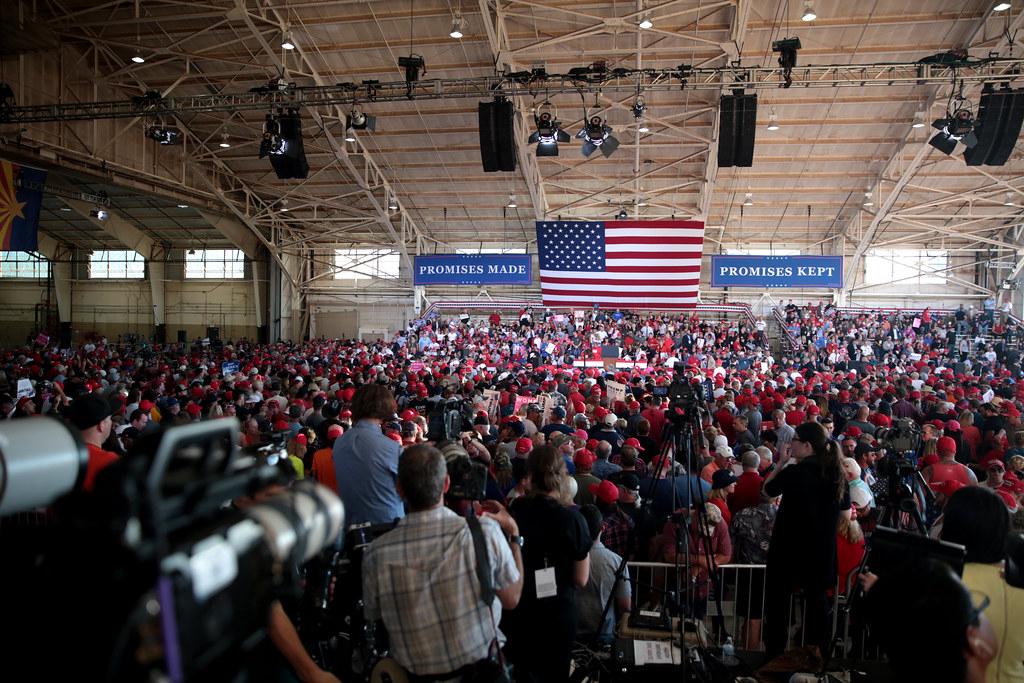Recent polling data reveals a textured landscape of voter sentiment in key swing states regarding Donald Trump's legal entanglements. As his roster of legal challenges grows, comprising over 90 pending criminal charges, the response from the electorate is neither uniform nor predictable.
Interestingly, polls show that a majority—53%—in pivotal states would not support Trump if he were convicted. The figure edges slightly higher to 55% if he receives a prison sentence.
Trump's technique of leveraging his legal affronts into political gains is a strategic use of crisis communications. By transforming courtroom appearances into high-profile bulletins, Trump clasps the news narrative, keeping his name anchored in the daily media cycles that criticize and inadvertently amplify his presence.
The psychology behind this tactic taps into the emotional reservoir of his followers, who see Trump's defiance as a mirror to their disenchantment with the system. His rhetoric is crafted to evoke feelings of siege—portraying himself and, by extension, his supporters as victims of a malevolent establishment that fears their brand of reform. This narrative is particularly effective at rallying his base, inspiring a united front against perceived injustice and overreach. It aligns with a broader societal discontent toward elites, making his campaign messages resonate on a visceral level with individuals feeling marginalized or ignored by the political status quo.
Trump employs repetition of key phrases like "witch hunt" and "fake news" to cement a skeptical view of the media and judicial processes among his followers. These repeated sound bites contribute to a self-sustaining narrative cycle, as voters informed by this echo chamber grow more resistant to counternarratives. It is a use of confirmation bias where each legal challenge faced by Trump serves to confirm the narrative of persecution pre-established in the minds of his electorate.
Trump's strategy appeals to individuals' sense of injustice against unfair targeting, doubling down during campaign rallies where the communal sentiment amplifies this perception. These instances serve as rallying cries that mobilize support and fundraising efforts. It is this mingling of confrontation with showmanship that maintains Trump's firm grip on a significant portion of the American political landscape.
In essence, Trump's ongoing narrative crafted around his legal challenges acts as a political lifeline that energizes his base. This plays into an overarching theme of us-versus-them that has become a hallmark of his political presence. The mixture of legal controversy and relentless public campaigning underpins an unconventional method where perceived liabilities are converted into sources of strength. Whether this approach will suffice in sustaining electoral success remains seen, embodying the sway of human emotion and perceived personal alignment in the realms of political loyalty and public opinion.

One of the intriguing dynamics surfaced by Donald Trump's relentless media magnetism, fueled further by multiple legal battles, is the overshadowing effect it exercises on his electoral competitors. Trump's adversaries frequently find their messaging condensed to mere footnotes within the news landscape. This disparity emerges not just from partisan dispositions but out of editorial inclinations towards narratives construed as immediately electrifying—or lucrative.
Trump's continuous media dominance becomes propellant to his authority in setting pivotal campaign discourse. Where one candidate's policy rollout might quietly simmer into obscurity, Trump's bustling appearances or contentious court exits harvest endless news cycles. This overwhelming presence creates an arena where his rivals must amplify drama or provoke controversy to garner similar attention. Such strategic enticements inherently mitigate the pure policy discussants might prefer, fostering an election environment intoxicated by intensity instead of informed by initiative.
Continual scrutiny over his criminal charges and rhetoric serve to concentrate the media lens and significantly adjust its focal length—supplying Trump an outsized stage upon which his accusations, defenses, and acclamation resound potently. This stage abbreviates room for competitors' disparate plans and personalities, confining their voices to cursory sound bites during segmented broadcasts—their policy salience drowned out amidst the tempest of Trump's tribulations.
As competitors are edged out in exhaustive media cycles pivoting around Trump's narratives, they struggle under the unintended censorship wrought by contestable relevance amidst a ceaseless stream of Trump-centric coverage.
Monitoring upcoming shifts in media engagement and emphasis will be pivotal in examining how extensively Trump's contentious situations confer a resonance onto him relative to a consortium of qualified yet potentially muted adversaries. Amidst this disruptive ambiance, viewing candidates' adaptive strategies, not solely in message refinement but in audience reorientation, will be critically instructive for understanding evolving discourses within America's political amphitheater.
Let Writio's AI write your content! This page was crafted by Writio.
Leave a Reply